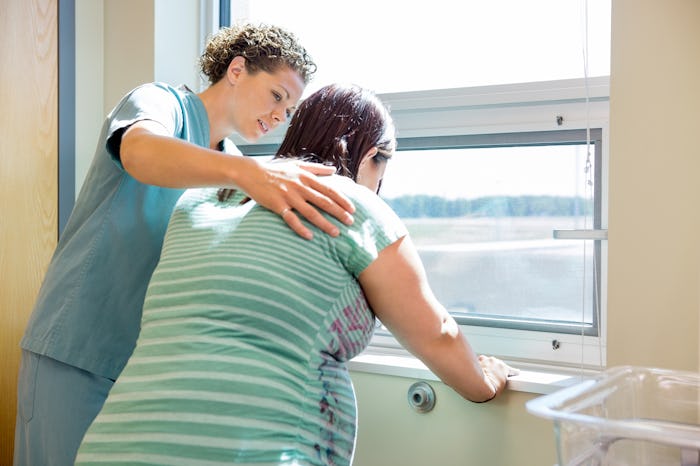Life

How To Tell If You're Actually In Labor, Or It's Just A False Alarm
You’ve spent (roughly) nine months waiting. That’s 270 days spent counting kicks, gazing adoringly at ultrasound pictures, and daydreaming about names. And now, the moment is approaching — childbirth. But how do you know exactly when it’s really the moment and not just a false alarm? If you’re wondering how to tell if you’re in labor, rest assured that there are some telltale signs your baby is on his or her way.
Now, keep in mind, there is still the chance of a false alarm. Thanks to the always-confusing Braxton Hicks contractions and a leaky pregnancy bladder, there are some symptoms that can be a bit misleading. Even the bloody show can cause a woman to think she’s in labor, when it is really just her mucus plug being expelled, according to the American Pregnancy Association. But there are some indications that you should press pause on Netflix and get yourself to a hospital or birthing center. I spoke with Eden Fromberg, a holistic OB-GYN and women’s health specialist, who shared several ways expectant moms can tell if they’re really in labor or if a prescription of more patience is in order. And if you’re still unsure after hearing her advice, there’s no harm in reaching out to your OB-GYN. After all, it’s your body. You know it better than anyone else.
1Your Baby "Drops" – Or Doesn’t
Many women think that it’s childbirthing time when they feel their baby descend into the pelvis, or “drop.” Not so, says Fromberg. “While it may be exciting to anticipate labor when the baby ‘drops,’ it can be days or even weeks away,” she says. “Babies may also ‘drop’ after labor begins, which is why a recommendation of cesarean delivery for the simple reason that the baby has not dropped is unwise.”
2Your Back is Achin’
There are a whole lot of aches and pains to be had when you’re pregnant, from leg cramps to round ligament pain. But does back pain close to your due date mean that childbirth is near? “Some women will experience aching back pain as labor approaches,” Fromberg says, explaining that a baby in the posterior position (head down but facing mom’s abdomen) pushes against muscles and nerves, causing excruciating back pain. But, Fromberg adds that postural and structural issues can also cause pain, so don’t consider this the be all, end all sign.
3You Start Having Contractions
Contractions are commonly associated with a woman about to give birth, right? But what you may be feeling are called Braxton Hicks contractions, which Fromberg describes as being “inconsistent and erratic.” So how do you know if you’re feeling the real-deal contractions that are a sign of labor? Fromberg describes Braxton Hicks contractions as being “quite tolerable,” whereas the contractions of labor are, well, not. Moms-to-be can also pay attention to the timing to distinguish the two. “It is the strong, rhythmic, consistent contractions approximately every two to five minutes during labor that dilate the cervix and lead to birth,” Formberg says. So break out the stopwatches and keep an eye on your pain.
4Your Water Breaks
It’s the pinnacle moment for every pregnant TV and movie character. Water splashing down between your, signaling that baby is on his or her way. This is often a sure sign that you’re in labor, as it means the amniotic sac has ruptured. But don’t wait for the waves to come before going to the hospital. According to What To Expect, only about 15 percent of women experience the rupture of the amniotic sac before they go into labor.
5You Experience "The Bloody Show”
The bloody show is a rather unfortunate name for the mucus plug, which blocks bacteria from entering your cervix. When it’s released, it means that your cervix is dilating and your body is getting ready for labor, but not necessarily within the next 24 hours. Still, if you feel uncertain after passing a mucus plug, Fromberg encourages you to talk to your doctor or midwife.
6You Feel The Need To Poop
One of the not-so-cinematically-friendly labor symptoms, is the intense feeling of having to poop – or actually having diarrhea. And, there’s a reason for it. “When baby presses on the rectum when low in the pelvis, rectal pressure will often occur,” Formberg explains. “Nerves stimulated may induce diarrhea as smooth muscles contract in both intestines and uterus.” The only problem is that you may not be able to tell if it’s a sign of labor or plain old ordinary stomach upset, making it one of those symptoms that you’ll want to discuss with your doctor or midwife.
7You Have A Burst Of Energy
Or major fatigue. “Shifts in energy often occur as the hormones and nervous system prepare for labor,” says Fromberg. “Nesting instincts arise, and some women become inspired to clean the house. The baby's adrenal glands help to signal the timing of the onset of labor as well.” Deciding late in pregnancy to go all Martha Stewart on your house isn’t reason enough to call the doctor or midwife, but it is something you may look back on and realize was, actually, a sign that baby was about to be born.